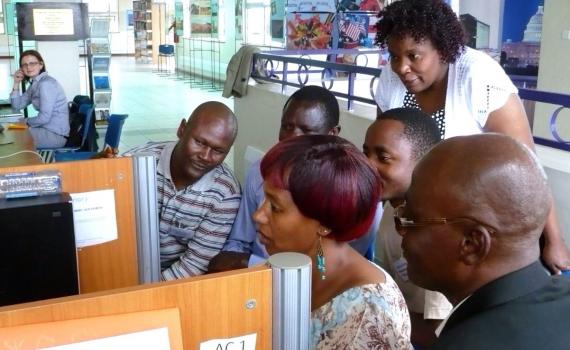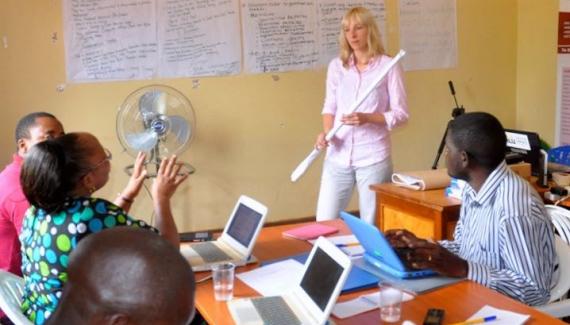
“I am proud, because I am empowered and able to offer ICT training to other people, and I am able to change others through this training.”
This feedback from a public librarian in Kenya came at the end of an intensive capacity building programme for public librarians organized by the EIFL Public Library Innovation Programme (EIFL-PLIP).
The capacity building programme, which took place over a period of six months in 2014/15, reached librarians from all public libraries in Ghana, Kenya and Uganda that have public access computers and the internet. The aim of the programme is to foster development of innovative services in which the libraries use digital technology to meet community information needs.
public librarians use ict in new services
When the training was over, we conducted an evaluation, and found that 90% of trainees believed they were ready to work on new ICT-based services, and felt inspired to take action.
Learners also shared information about new projects and the work they were doing in their libraries as a result of the training.
A librarian from Tamale in Ghana’s Northern Region told us about a new technology training initiative that he had started for girls who have extremely limited access to computers and the internet. From the same library, another librarian shared information about a project that he had initiated to address educational needs of school dropouts who are involved in dangerous and illegal small scale mining.
A librarian from the Kenya National Library Service (KNLS) is starting a new SMS (mobile phone text messaging) information service for farmers. She will find out more about their information needs; research the internet, and send the needed information to them via SMS. In addition, she will use SMS to inform farmers about the latest prices of farm produce.
Another KNLS librarian is working with her colleagues to support a local women’s empowerment programme. The librarians are providing ICT training to the women, supporting them in searching for funding and investment in their projects, and helping them to write proposals.
A librarian from Uganda spoke about an initiative to inform women aged 20 and above about cervical cancer, helping them understand preventive measures. She encourages women to come to the library where she explains what will happen during a visit to a gynecologist, and uses the computer to provide further information about signs and symptoms of cancer. She also teaches the women how to use email and the online communications tool, WhatsApp.
Another Ugandan librarian has been arranging meetings with municipal officials to discuss how to increase use of the library - especially library ICT - by local schools.
THE NEED TO BUILD LIBRARIANS’ ICT CAPACITY
The capacity building programme grew out of our grants programme, which supports development of innovative public library services that use ICT to meet community needs. Since 2010, EIFL-PLIP has supported initiation of over 20 new ICT-based library services in Africa. Evidence of the positive impact of these services in communities encouraged us to look for ways to scale up innovations in public libraries.
However, we realized that before scaling up, further work was needed.
The first issue to address was the image of libraries. The EIFL study, Perceptions of Public Libraries in Africa (2011), showed that most people associated public libraries with traditional book lending and reference services for children, rather than a services that meet community needs, and technology. At the same time, we knew that governments were investing in ICT to improve access to technology and information, but libraries were generally not part of their plans.
We therefore supported the initiation of multi-stakeholder advocacy groups in Kenya, Ghana and Uganda to build government and public awareness about the ways in which public libraries, by offering public access to computers and implementing proactive services, could support community information needs.
Advocacy targeting national and local government was rewarded, and public libraries are now increasingly receiving computers and internet connections as part of government ICT roll-out programmes.
Results of our 2011 research into perceptions of public libraries in Africa had also told us that public librarians did not have sufficient skills or confidence to use ICT. In 2014 we conducted skills audits of public librarians in Ghana, Kenya and Uganda, which confirmed the earlier findings.
CAPACITY BUILDING TO INSPIRE AND SCALE UP SERVICE INNOVATION
We developed a training curriculum to fill skills gaps and to inspire and enable innovation in public libraries. The curriculum includes advanced use of ICT; internet search strategies and identification of trusted information sources to serve local information needs; development and management of new ICT-based library services; community needs and impact assessment, and communications and advocacy.
In each country, we reached out to local partners to customize, plan and deliver the training. All trainees (about 25 - 30 in each country) were selected from libraries that had recently been equipped with computers and internet by government.
Post-evaluation training results showed that the librarians had left the training feeling more skilled and motivated. They reported using ICT in their libraries more often and with greater confidence.
In addition, the training had strengthened the status and position of librarians in their communities. In all countries, trainees reported feeling more confident in engaging in dialogue with the authorities and the community to address local challenges.
 SCALING UP SERVICE INNOVATION
SCALING UP SERVICE INNOVATION
We feel confident this well-structured and intensive training programme has built a strong base for scaling up public library service innovation in the three countries where it was implemented.
We recently shared results of the training at the first AfLIA (African Library and Information Associations and Institutions) conference in Accra, Ghana (30 May 30 - 2 June 2015), which was attended by library leadership and librarians from 23 African countries. The presentation was well received. The audience strongly supported our recommendation that training like this would energize public librarians to think creatively about the most effective ways to use ICT to serve their communities.
We have adapted the capacity building programme for public librarians in Ethiopia, and start training in Addis Ababa in July.
Public libraries from any other country who wish to find out more about our training, and join us in this journey to a more innovative future, are welcome to contact us.
Ugne Lipeikaite, EIFL-PLIP Impact Manager contributed towards curriculum development and served as a trainer for the EIFL-PLIP Africa capacity building programme.
SHARE / PRINT







